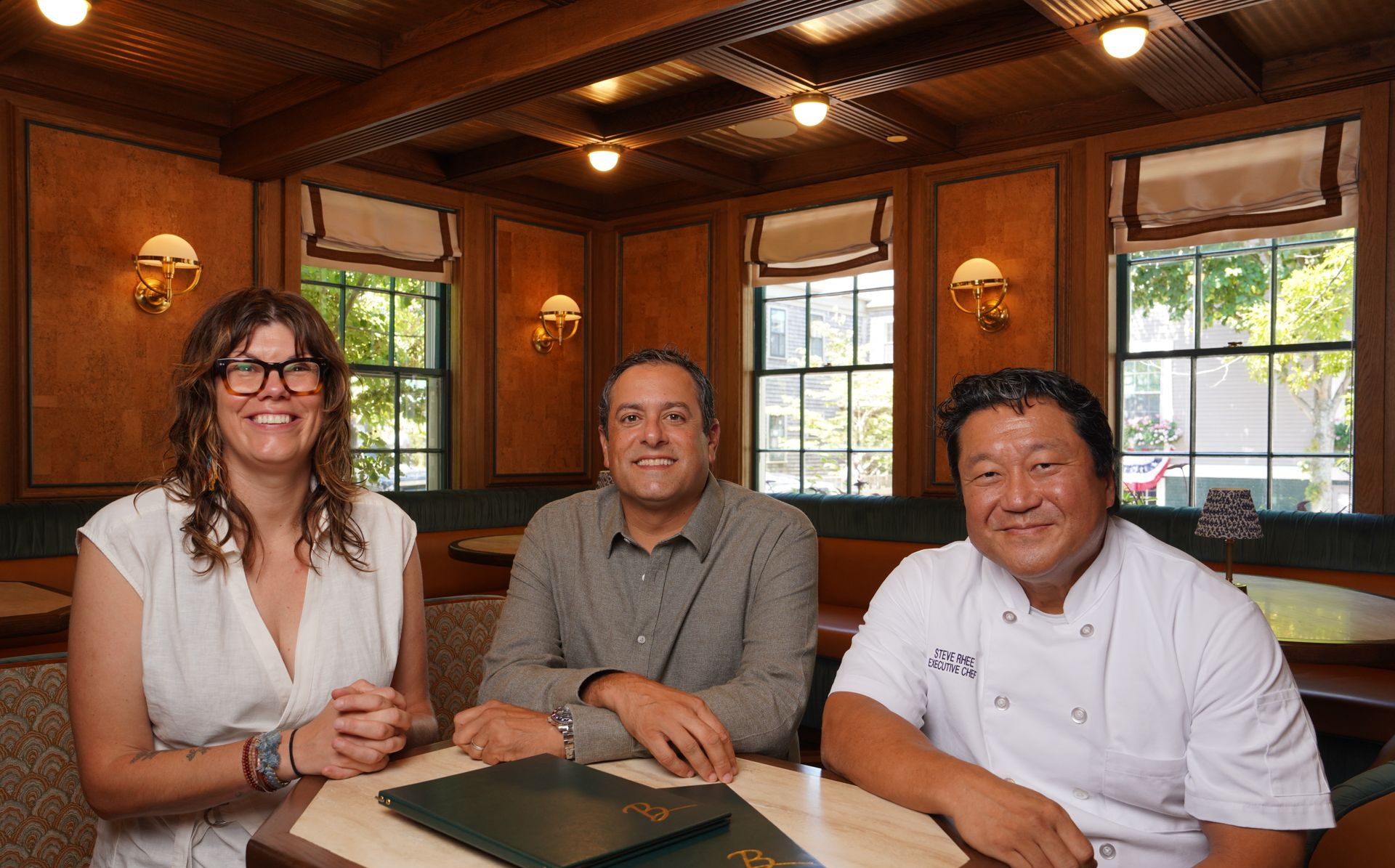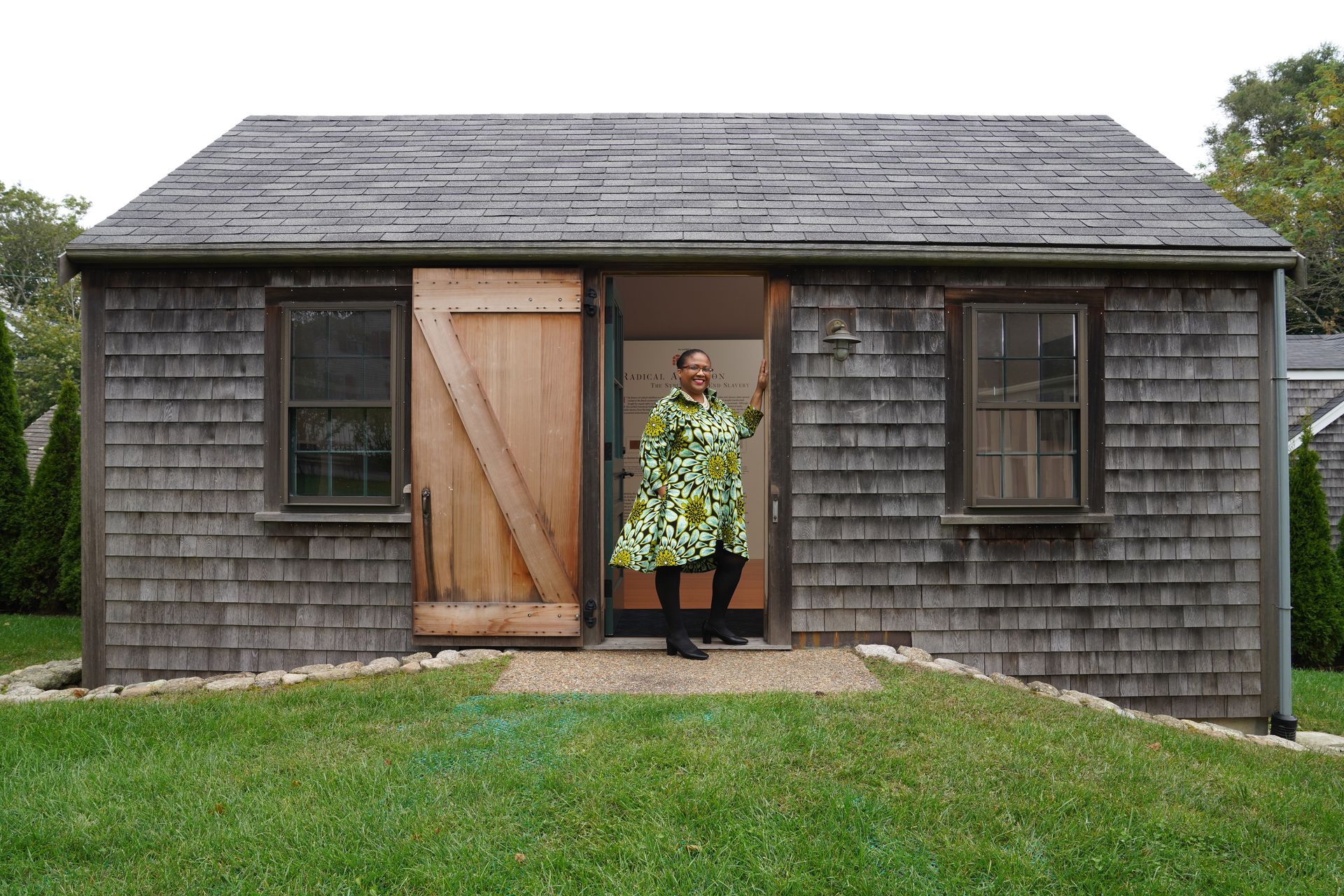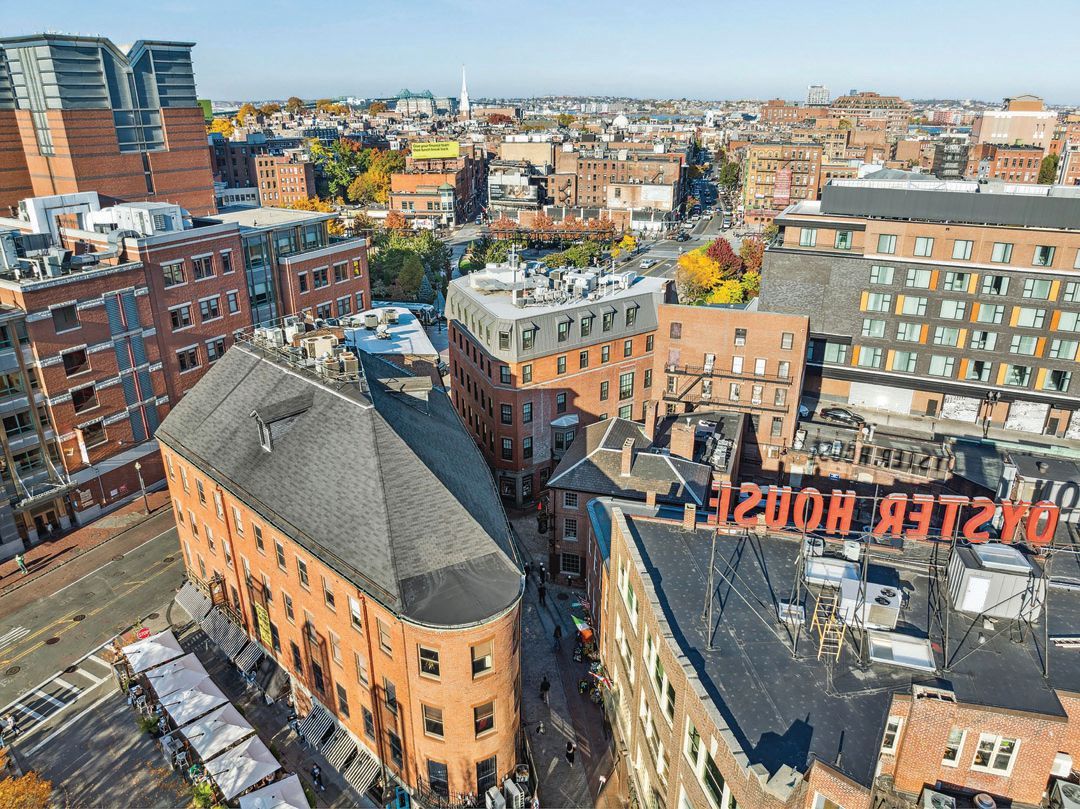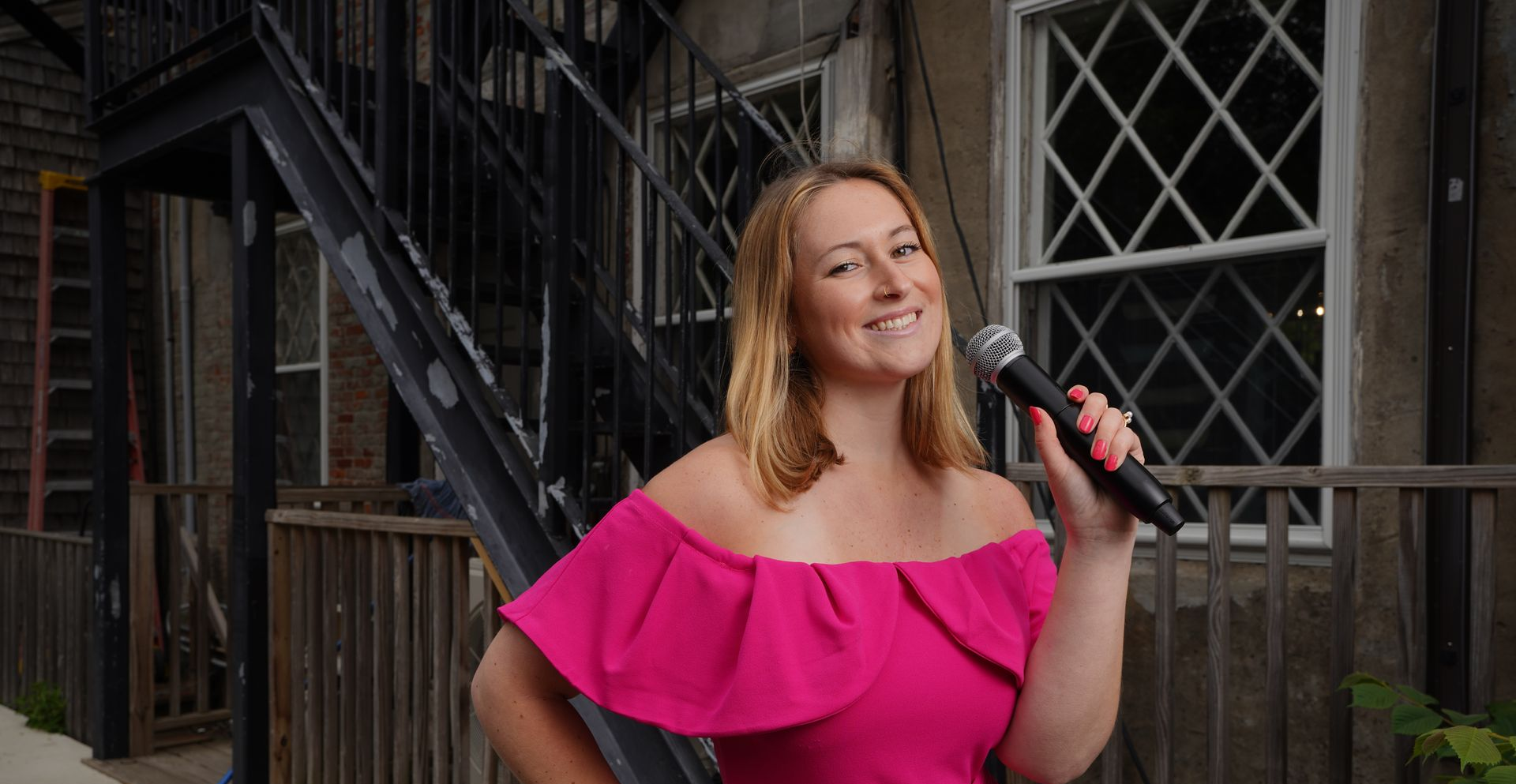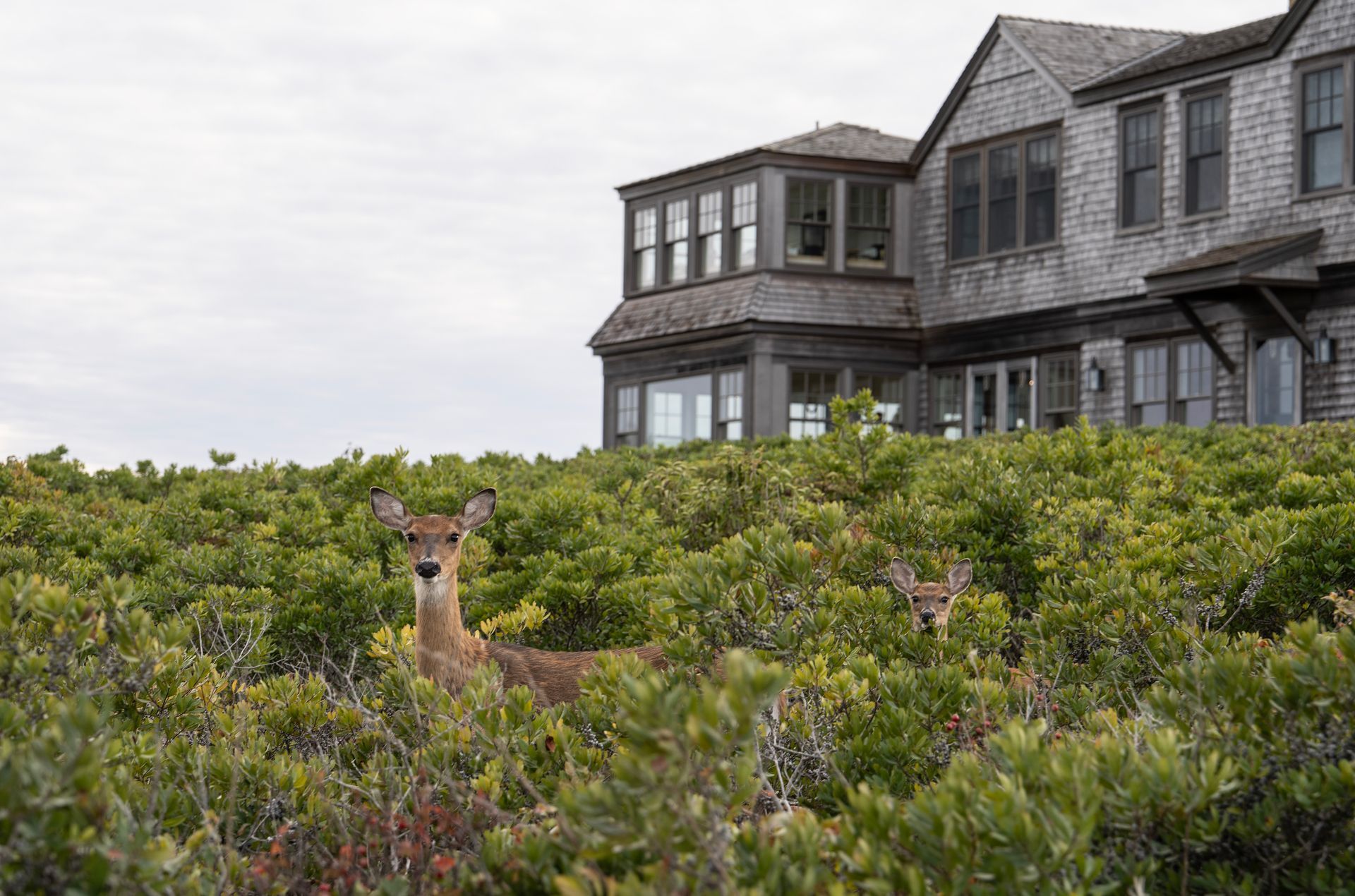FROM LOCAL TO GLOBAL
Congressman Bill Keating manages to lead on a global and local level.
interview by Bruce A. Percelay
Congressman Bill Keating has served as the U.S. representative for Massachusetts’ ninth congressional district since 2013. Keating followed in the path of former Congressman Bill Delahunt and has been reelected four times to his post. A major component of Keating’s work has related to fishing management as well as other maritime policy issues. Unlike many of his Democratic peers, Keating remains open-minded to the use of nuclear power as a way to provide clean and efficient energy for the region.
On a national level, Keating sits on the House Foreign Affairs Committee, where he serves as chair of the Europe, Energy, the Environment and Cyber Subcommittee. He joined a congressional delegation to Afghanistan, Pakistan and Iraq shortly after Osama bin Laden was killed by U.S. forces in May 2011. He also sits on the Armed Services Committee. While playing a role in global matters, Keating has managed to make the Cape and the Islands his focus, and in some instances, he used his global influence to benefit policy matters relating to this area. N Magazine sat down with Keating on Nantucket to discuss important local and global issues of the day.
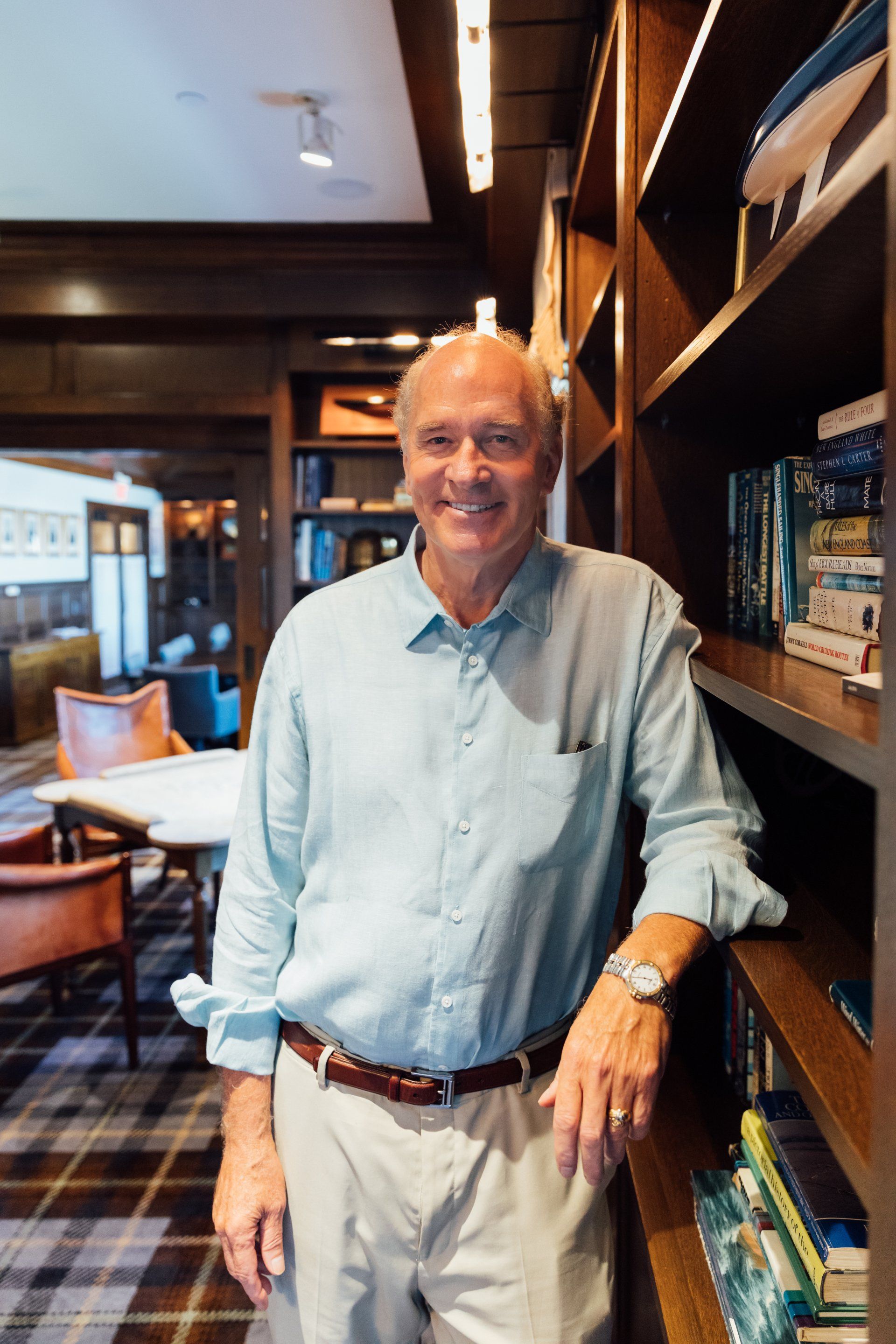
How bad is the collateral damage to Europe right now from the events in Ukraine?
Had Europe not acted with us on Ukraine, it would be much more severe. Number one, in terms of Russia’s aggressiveness, Putin made it clear that his aggression is just not going to stop with Ukraine. It’s really to move forward to Moldova, Poland, Baltic countries. Regarding the collateral damage you talked about, it’s largely energy. That’s been a longstanding problem with Europe...their dependence on Russian oil and gas. Twenty-five percent of their oil and 40 percent of their gas comes from Russia. That is disproportional. When I look at the collateral damage that Europe and [we] here in the U.S. and in the West suffer, it would be far greater if that unity wasn’t there. Putin wasn’t counting on that kind of unity. He miscalculated completely on the extent of that unity, so we’re suffering from that here less than Europe, because we’re only 10 percent reliant on Russian oil. They’re facing a great crisis.
On the topic of energy, you have been open-minded toward nuclear power. Yet for many people, just the term nuclear is radioactive. How do you change the perception around nuclear?
We have to refocus on the technology that’s changed and particularly small modular nuclear reactors. They’re about the size of a school bus, and they can recycle all waste units so they’re much more efficient, much less waste. A small unit like that can be very portable and can service 100,000 households for all their energy needs...I think we’ll probably see it start in Europe quicker than here. That’ll help here as well because they’ll see the experience there.
Nancy Pelosi’s visit to Taiwan in August generated a tremendous amount of concern. Were the Chinese inspired behind what Russia has done?
China is our number one threat in the world in spite of what’s going on with Russia, both economically and in terms of geopolitics in the region. Most of our experts believe that there’s a connection between what’s happening in Ukraine and what could happen in Taiwan. China is looking to see if there’s an opportunity. The threat is very real. The time frame I don’t think is imminent, but the threat is very real. And that’s the opinion of our military experts, our intelligence experts, not mine alone.
You’ve been in this business for a long time. Have you ever seen the world more unstable?
In my lifetime? No.
I think it’s more dangerous now than it ever has been because democracy is really being threatened, and it’s just not Ukraine and Russia. Just look back at the French election, look what’s happening in Hungary right now. Poland was moving in the same direction of authoritarianism as Hungary was, before Ukraine. This is not just a threat in Europe. I never thought authoritarianism would be a threat here, but it’s happening right now in the United States. We saw it with the election denial, the “big lie.” We saw it with an actual attack on the Capitol building. We’re seeing voting rights being undercut. Suppression, purging, the actual calculation of the votes. This is real, and it’s happening in our country.
There could be a shortfall of a half million recruits for the military, at a time we need our military to be as strong as ever. Can you talk about the preparedness of the military as it relates to threats around the world and in our ability to convince the world that we are not to be threatened?
People shouldn’t be concerned. Our readiness is beyond anything imaginable. If you took most of the rest of the world and put it together, they wouldn’t be as strong as we are. From a military standpoint, there are things we have to do. Modernization is one of them. I also think we have to look at prioritizing the military. We have to make sure we have air power and space power. We’re ahead of everyone technologically, but the Chinese are closing that technological gap. We have to be particularly careful with that.
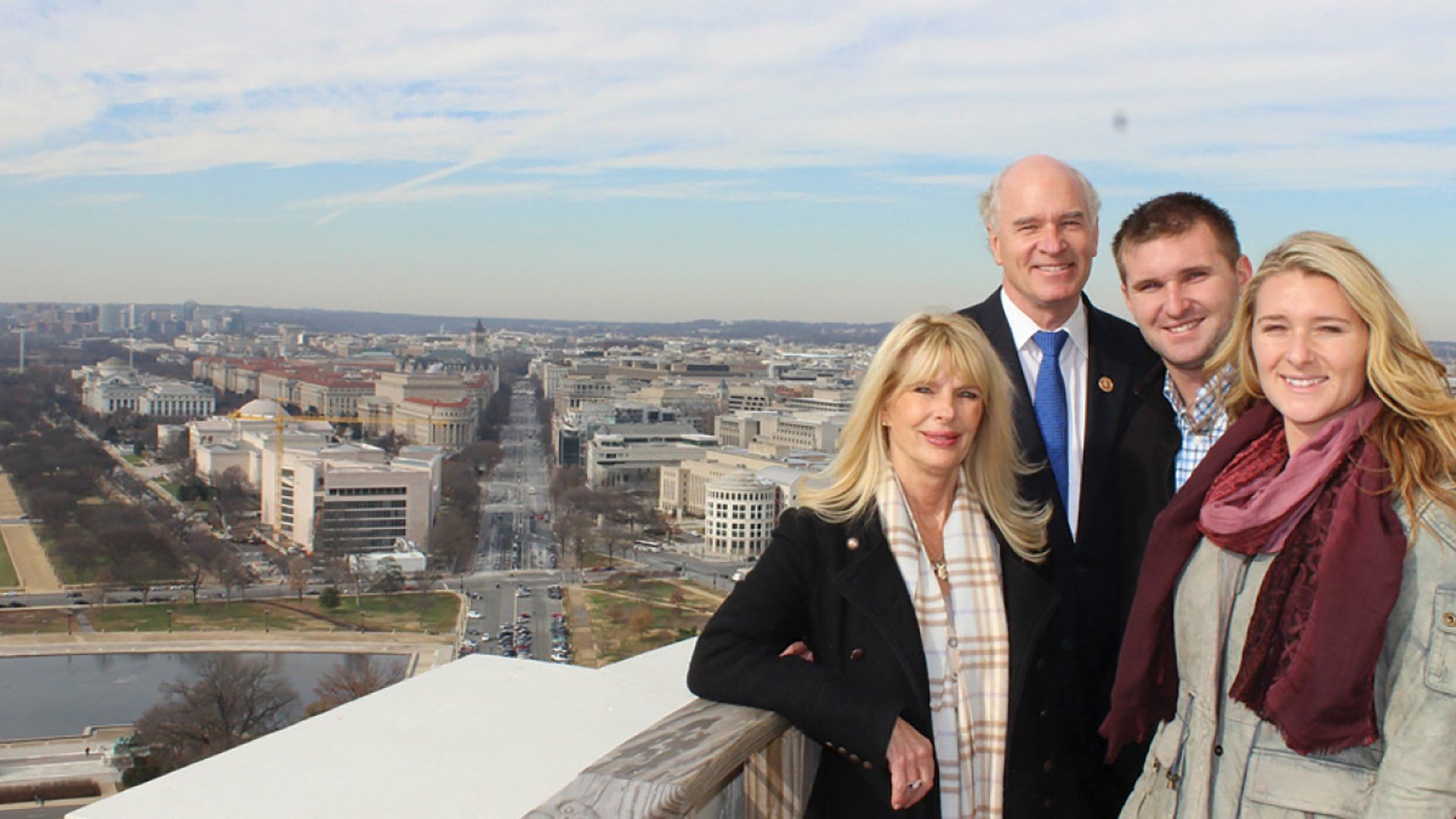
Nantucket can suffer from the perception of the land of plenty, when in fact we suffer from many of the problems that other communities in Massachusetts do. Let’s start with housing.
There’s no magic bullet for housing. Given Nantucket’s geography, it’s a bigger issue than the Vineyard and Cape Cod. What do we do about housing? The housing issue, you can’t miss the obvious: It’s supply and demand. There’s a house on the market here for $56 million. The average cost of a home, average, right now is $3.6 million. And the average household income in Massachusetts is $85,000 a year. The housing issue is very difficult. If it was easy, there would be a solution for it. And I think there can be some incremental benefits that can be done. On every front with Nantucket, don't take your eye off the obvious. Housing is an issue. There are resources that are available that local government, county government want to pursue. It's there. And the same with the environmental issues.

Do you have an opinion on the Land Bank’s impact on housing? The town owns now close to 54 percent of the open space. Are we gilding the lily, and is that Land Bank fee now inappropriate, given the nature of the problem? Should that be redirected?
Years ago, Nantucket officials were very wise realizing that there had to be some control in how land was used. If things are difficult now, think of what they would be like if over half the island wasn’t an open space. It would probably be much more magnified. Looking back over time, that was very shrewd of Nantucket, not just to preserve the beauty and the environmental issues, but also because the growth would have been out of control years before this. The problem would’ve been worse by multiples. The Land Bank still remains critically important, and the funding remains important.
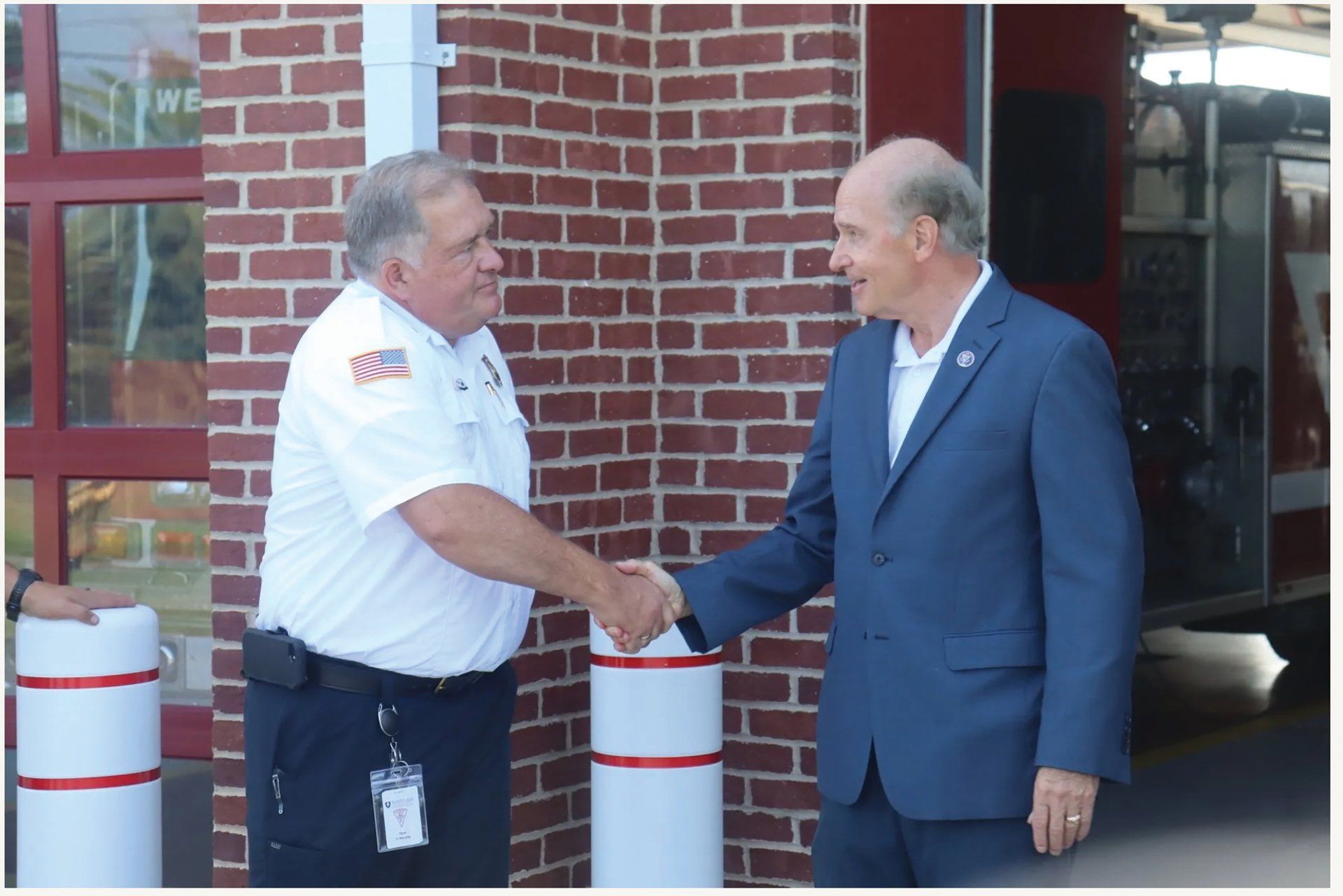
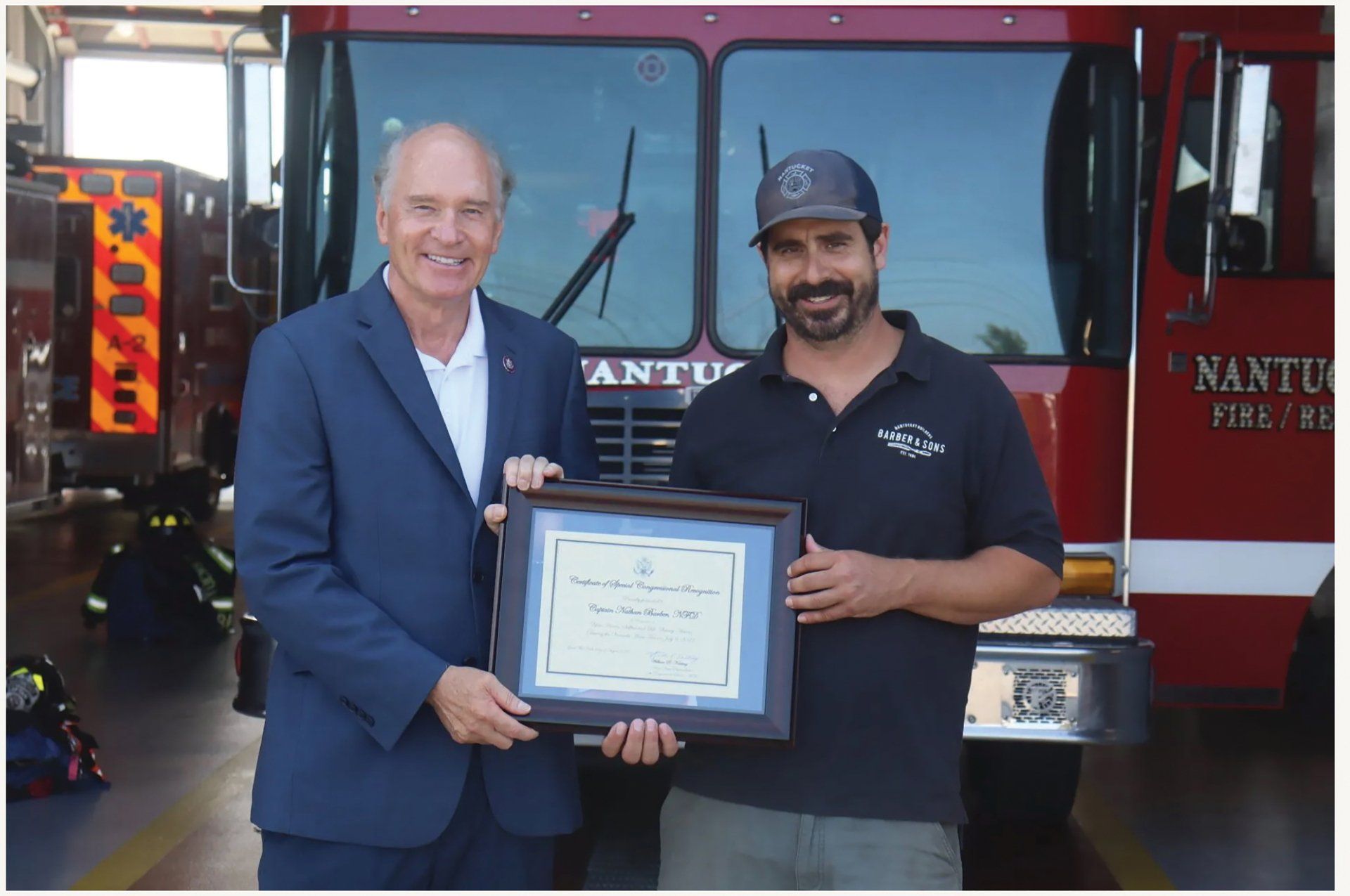
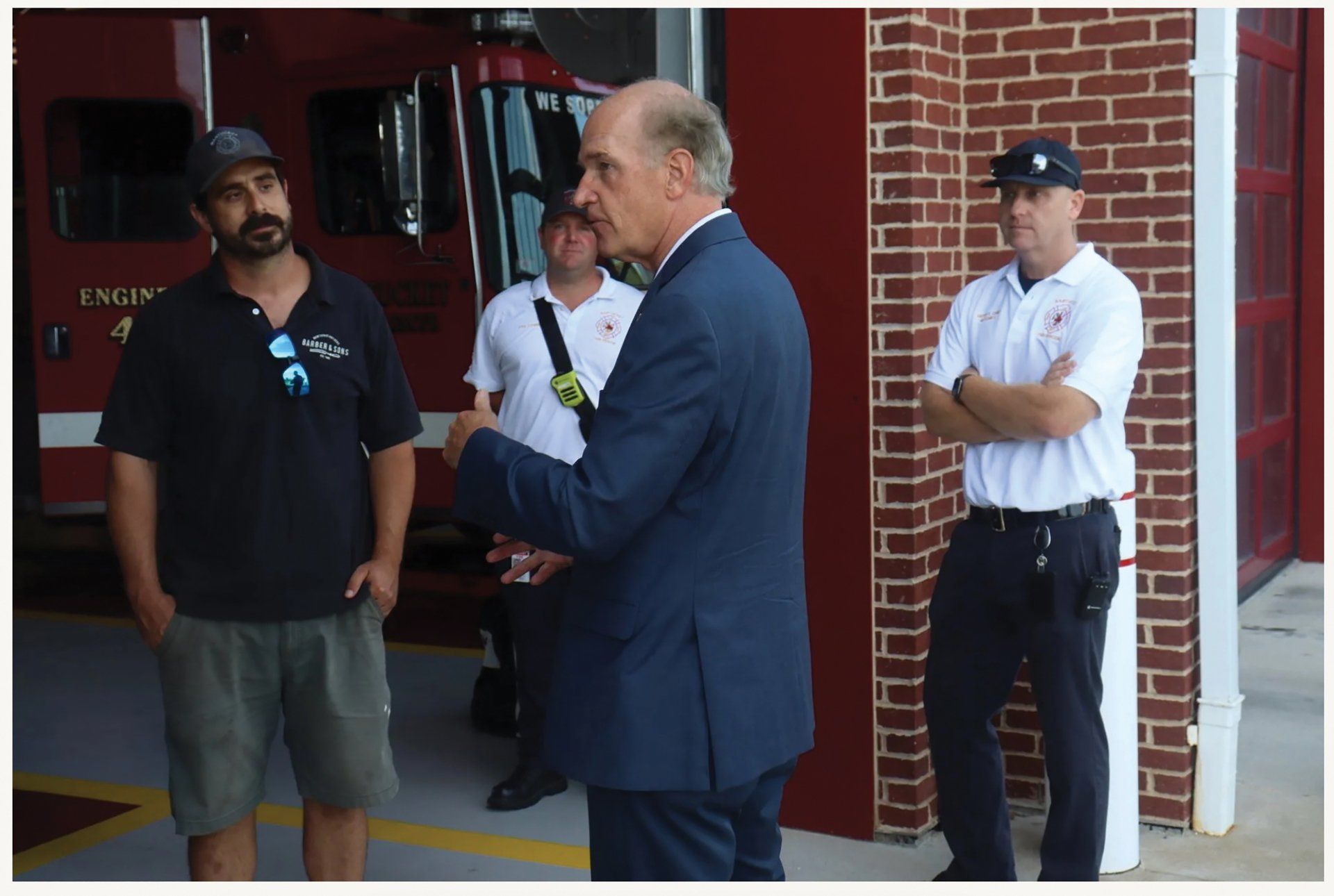
Congressman Keating visiting the Nantucket Fire Department where he recognized firefighter Nate Barber for his heroism in the Veranda House fire.
The controversy du jour right now that is really growing is the Vineyard Wind project owned by Avangrid. There are a lot of questions that are starting to bubble up as to why they are spending so much money to, in some people’s view, buy silence as to concerns about the potential impact relative to the migratory pattern of whales and so forth. Nantucket received $16 million. That kind of money has gone to places like the Boston Aquarium as well. So there are some people who feel that this smells fishy. What is your take?
I always try and step back when there’s controversy and take a long view first. And my long view is, energy by its very nature, since the civilization of mankind, has always produced byproducts that were harmful. Whether it’s the initial fires that spread to forest and agriculture, to what we’ve seen with the fossil fuel industry and what it’s done, or we’ve even seen [done] to shale. That has always been the case. The key is to always minimize that Imact. In the big picture, having offshore wind is a plus. We have to move away from fossil fuel, or the other industries, whether it’s fishing or the right whale, will all be casualties as well eventually. We have to do it, and we have to do it in as smart a way as we can. Renewables are important and offshore wind is important.
I don’t think they’re buying people off. It’s not a case of being paid off or silenced with groups. These corporations don’t like to give money away, and they’re privately invested, so that even the fiduciary responsibility probably is pushed in not just giving money. A lot of the monies have gone for research. A lot of that money set aside goes for research, the continuing research that’s involved. Now we want to get this one right because—this is the linchpin—this is the first large commercial venture. And it’s going to go right down the East Coast. There are a lot of eyes on Vineyard Wind, making sure that they’re not allowed to, for any business reasons, venture any further than they have to.
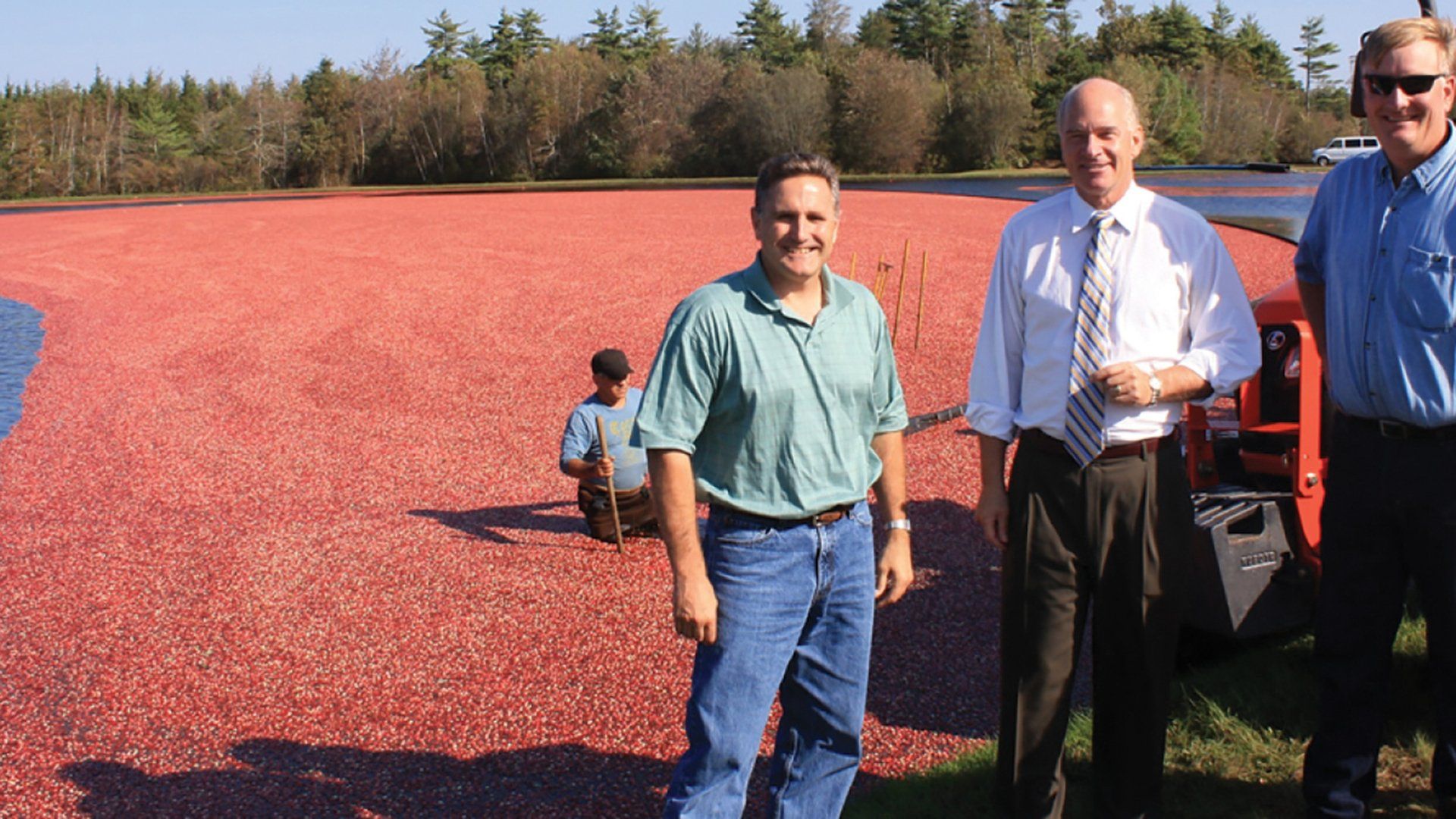
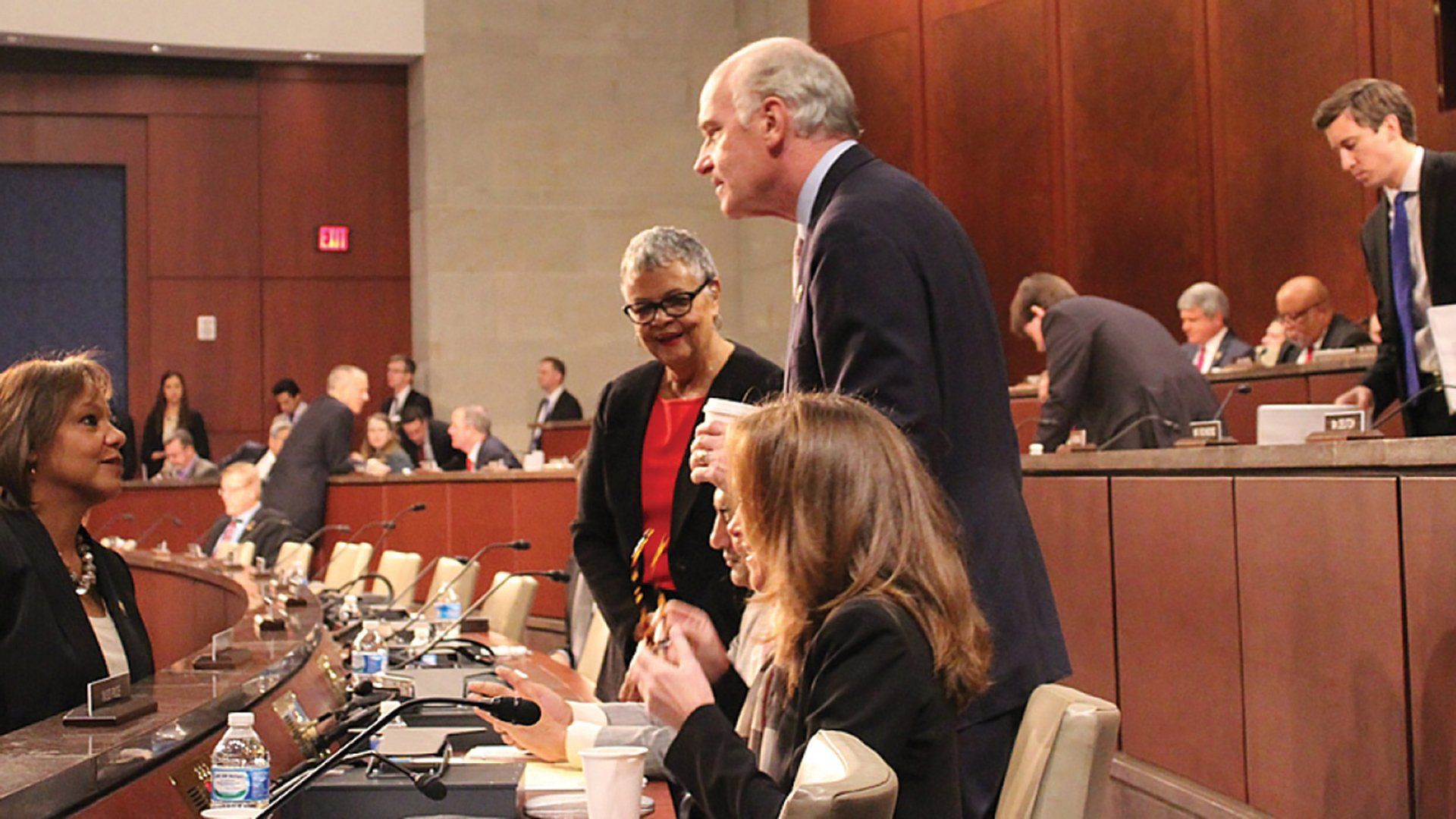
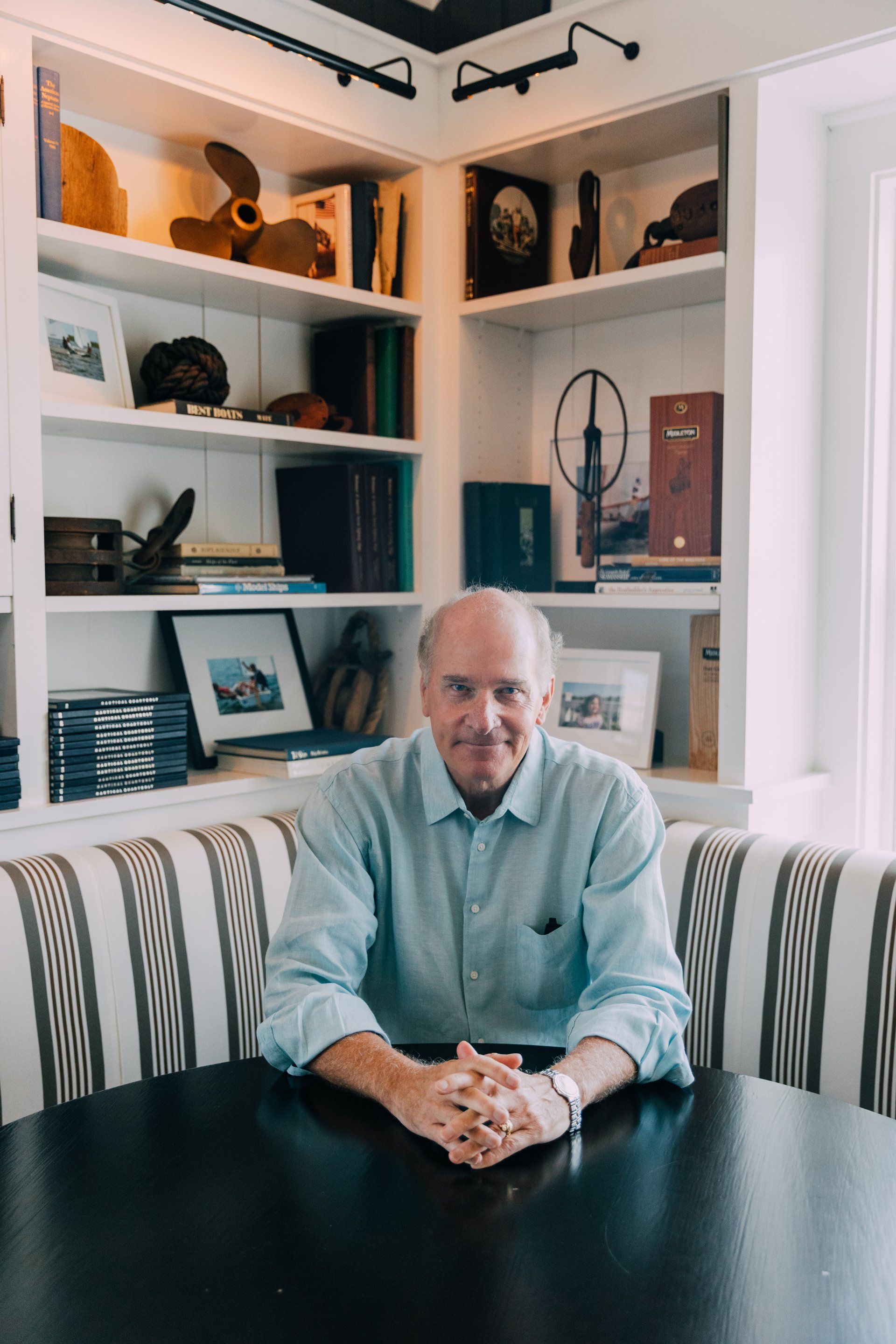
There’s a dichotomy in your job. You’ve got this global view, and you’re representing the Cape and Islands. Could you elaborate on the story of how you were able to use your global influence to impact cranberries?
Trump used tariffs as his own personal tool sometimes and did terrible damage, particularly to our allies. Once you have a tariff, you have to retaliate, so our allies came forth with all these targeted retaliations. They did it on Kentucky bourbon because of Mitch McConnell. And they did it on cranberries, because Paul Ryan, who was the speaker at the time, has Wisconsin, which, along with our region, [has a thriving cranberry industry.] They announced these retaliatory tariffs, so I called some of my friends in Europe and said, “I know you’re doing it because of Paul Ryan, but I’m collateral damage here. This isn’t fair, can you do anything?” The ambassador to the EU at the time said, “I don’t think I can. It’s too late, but I’ll try.” He had to get all the other countries to agree. He emailed me back and said, “It’s off.” So yes, those relationships really can help here.
As far as Nantucket goes, you consistently put up election numbers that most people would die for. What are you most proud of that you’ve done for Nantucket?
When I look at Nantucket, I keep my eye on the obvious. Access is number one. You need access or else you’re in enormous trouble. We have to have airports and marine transport with the ferries. So those access issues are front and center to me, all the time. And then getting workers. H-2B [temporary nonagricultural worker visas] becomes a very big priority for me, as well as J-1 [exchange visitor visas]. Housing’s more difficult, and from the federal perspective, that much more removed, to provide all these resources. Another huge priority to me has been environmental. So my approach to Nantucket is nuts and bolts. My focus has always been on the obvious basic needs and how threatened they can be unless we work hard to anticipate them and deal with them.
*This interview has been edited and condensed due to space limitations.

